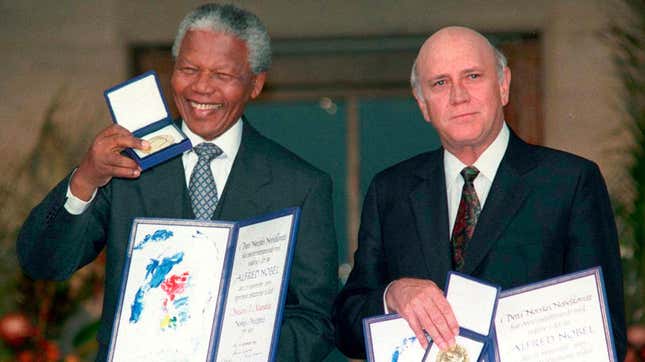
FW de Klerk, South Africa’s last president of apartheid and the polarizing figure who shares a Nobel Peace Prize with the country’s beloved late president Nelson Mandela, has died at 85 years old.
The FW de Klerk Foundation announced on Thursday that the former president passed away in his home from mesothelioma cancer, according to CNN.
From CNN:
He effectively announced the beginnings of a new country in one historic speech at the state opening of Parliament in 1990, revealing to a stunned nation that he would free Mandela, legalize anti-apartheid groups, end a national state of emergency and negotiate to end racial inequality in the country.
De Klerk’s political transformation, sparked by worsening racial tensions and the impending possibility of civil war, led him to be cast as a “traitor” by some conservative lawmakers.
It also marked the beginning of lengthy and tense negotiations, during which de Klerk and Mandela developed a complex relationship that occasionally resembled friendship but more often became strained, bitter and adversarial.
In 1993, de Klerk and other leaders ratified a new constitution that formally ended decades of racial segregation in South Africa.
De Klerk went on to lose South Africa’s first multiracial, fully democratic election to Mandela, before taking a post in the new government.
De Klerk’s own father and grandfather, both involved in politics, were avid supporters of apartheid while he was growing up. His uncle, Jan de Klerk, also served as a prime minister, the New York Times reports. So understandably he shocked the nation with announcing the legalization of anti-apartheid groups and negotiations for a democratic government in 1990.
While many hailed the conservative politician for his progressiveness in ending Apartheid and creating a smooth transition for the first democratically elected leader Mandela, some hesitated to give him too much credit in the final years of his life.
And in 2012, anyone who heralded him as a die-hard anti-segregationist was in for a serious surprise.
From CNN:
He described himself as a “convert” in an interview with CNN in 2012. “The goal was separate but equal, but separate but equal failed,” he added. “We should have gone much earlier with the flow when the winds of change blew across Africa.”
De Klerk nonetheless created a complicated legacy both during his time in power and after his retirement.
In the same 2012 interview, de Klerk caused anger by equivocating on whether apartheid was a morally repugnant policy. “I can only say that in a qualified way ... there were many aspects which are morally indefensible,” he said.
Last year, his foundation issued an apology after de Klerk claimed that apartheid was not a crime against humanity during an interview with South African public broadcaster SABC.
“Allow me in this last message to share with you the fact that since the early ’80s, my views changed completely,” de Klerk said in a final video message released by the foundation after his death, according to the Times. “It was as if I had a conversion and in my heart of hearts realized that apartheid was wrong.”
De Klerk is survived by his second wife Elita, and two of his surviving children Jan and Susan.

